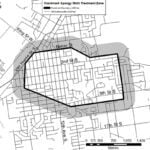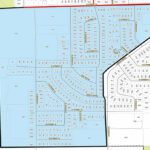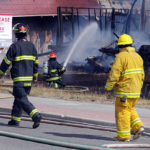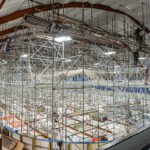Home »

Trump re-ignites softwood dispute
e-KNOW news
By Ian Cobb
US President Donald Trump has turned his tough talk toward Canada’s softwood lumber exports, resurrecting a 35-year-long Canada-US Softwood trade dispute.
 The U.S. Department of Commerce April 24 announced that preliminary countervailing duties of nearly 20% will be applied to the majority of Canadian softwood lumber shipments entering the United States.
The U.S. Department of Commerce April 24 announced that preliminary countervailing duties of nearly 20% will be applied to the majority of Canadian softwood lumber shipments entering the United States.
Preliminary countervailing duties in the form of cash deposits become effective around May 1, (once notice published in U.S. federal register) for four months to the end of August. Thereafter, these duties will not be collected until the final orders are published in January 2018, a B.C. Ministry of Forests, Lands and Natural Resource Operations (MFLNRO) press release explained.
The U.S. Department of Commerce argues that the countervailing duty is required to offset what in its view is unfair subsidies that Canadian and provincial governments allegedly provide to lumber companies.
A company that operates in the East Kootenay, Canfor, is among five B.C. companies the U.S. Department of Commerce investigated and assessed preliminary countervailing duties.
Canfor has been assessed a 20.26% countervailing duty, followed by: Irving 3.02%; Resolute: 12.82%; Tolko: 19.50%; and West Fraser: 24.12%.
The preliminary countervailing duty assessed on all other companies is 19.88% (the average of the duty rates assessed on the five companies). In addition on April 24, the U.S. Department of Commerce found “critical circumstances” applied on a preliminary basis to Irving and all other companies, but not to Canfor, Resolute, Tolko and West Fraser. This means that Irving and all other companies may be assessed countervailing duties on their shipments made since about Jan. 31 (90 days prior to the notice being published in the U.S. federal register, expected around May 1), MFLNRO reported.
Cash deposits are held in trust by U.S. Customs until all avenues for appeal are exhausted. Options for appeal will be assessed at the time all final orders are issued, which is currently expected to be in January 2018.
On June 23, the U.S. Department of Commerce is expected to release its preliminary determination on anti-dumping duties. The Department of Commerce argues that an anti-dumping duty may be required to offset what in its view are unfair selling practices by Canadian lumber companies that are allegedly selling lumber into the U.S. at a price below their costs or sales value in Canada. Critical circumstances also would apply to Irving and all other companies on a preliminary basis.
Premier Christy Clark said today the duties imposed are unfair and pointed out that past US allegations of unfair subsidies have been proven false.

“The United States has imposed unfair duties ranging from 19.5 to 24.1 percent on British Columbia softwood lumber exports into the United States. In addition, they have imposed critical circumstances findings on all but three of our largest producers, requiring all other companies to post bonds worth the value of the duty had it been in place for the past 90 days,” Clark said in a public statement.
“Despite there being no actual evidence of unfair trade practices, the U.S. is taking a ‘presumed guilty until proven innocent’ approach with the rest of our industry. It is important to remember that in every softwood dispute, the U.S. allegations of subsidy have been proven false. We believe that will be the case in this round as well.
“Now more than ever, British Columbia needs to be strong. We will stand up for B.C. forest workers and communities by fighting this unjustified U.S. trade action with every tool at our disposal,” she said, noting she believes Canada is coming from a strong position.
“We will stand united in the face of this baseless U.S. trade action. Prime Minister Trudeau and the federal government have been extremely responsive, putting softwood at the top of their agenda. We will continue to work side-by-side with them to make sure the needed supports are in place for displaced workers in the event of job impacts, and to accelerate the diversification of our forest products and markets.”
Clark said the provincial government has an “Action Plan on softwood” and “will fight the unfounded claims of the U.S. lumber production lobby and the unwarranted and unfair duties placed on Canadian lumber products.”
This preliminary period is the time for B.C. and Canada to reinforce “our efforts to reach a fair deal with the United States and work with U.S. home builders and lumber retailers to demonstrate that Canadian softwood lumber is a critical component of continued U.S. economic growth,” Clark said, adding government will continue to work with the federal government to ensure B.C. forest workers are supported in the event of job impacts.
Continuing to seek other markets is another tactic. “We will accelerate our proven actions to diversify our markets and products to further reduce our reliance on the United States – having already increased our softwood lumber exports to China by close to 2,000% per cent, with strong progress in other Asian markets,” Clark stated.
“As the trade action develops, we are going to work to ensure that B.C. mills can stay open despite the impact of U.S. protectionist and punitive measures by: Pre-purchasing B.C. lumber that could be used for BC Housing projects and ensuring B.C. mills continue to have a strong domestic market.”
The premier suggested immediately following the May 9 election additional trade missions should be sent to India, China, Japan and other Asian countries.
“As we’ve announced, BC will establish a permanent trade office in Washington, D.C. and significantly increase our presence in addition to David Emerson’s role as special envoy. And we will explore any additional levers at our disposal to secure a deal that’s fair for B.C.,” Clark said, admitting, “It’s going to be a battle, but we’ll succeed because everyday Americans want the same things we do – housing that’s affordable and jobs to build those homes. And because every time these U.S. industry allegations are tested in an impartial court, they lose – because the facts are on our side.”
As this news has broken while B.C. barrels toward a provincial election, other party leaders took the opportunity to comment.

NDP leader John Horgan agrees with Clark in that the duties are unfair and unjustified but blames the premier for failing to make softwood a priority.
“Forestry is vital to British Columbia’s economy, to the livelihood of tens of thousands of B.C. workers, and to our communities. B.C. is the biggest trading partner for softwood lumber with the United States. I am disappointed by the actions taken against our industry. The claims being made by the United States are entirely unjustified. B.C.’s forest sector is fair and market based and we will vigorously defend against these unfair tariffs.
“I am equally disappointed that Christy Clark failed to make getting a deal a priority, and failed to lead British Columbia to a fair resolution on softwood lumber. She has not treated this issue with the urgency it deserves. Because of delay and inaction, thousands of B.C. workers now risk losing their jobs and their livelihoods,” Horgan stated.
“While the Premiers of Alberta and Saskatchewan have visited Washington DC to advocate for their province’s interests since the election of Donald Trump, Premier Christy Clark chose not to. Instead she said she was ‘optimistic,’ calling him a ‘builder.’”
“Horgan promises that if/when elected Premier, he will travel to Washington DC within 30 days “to make sure B.C. is properly represented in the softwood lumber dispute. I will sit down with US representatives, and I will ensure our government is taking every possible action to get a deal on softwood lumber to protect the jobs in our forest industry.
“Our future economic prosperity is at stake. We cannot afford any further inaction or delay. It is time for direct and immediate action to defend B.C.’s interests in the softwood lumber dispute, to ensure a fair deal for British Columbia,” he said.

Andrew Weaver, leader of the B.C. Green Party, also set blame sights on Christy Clark and her Liberal Party government.
“This news is devastating for the B.C. forestry industry, which has already struggled under the Christy Clark government. Forestry is one of our most important resource sectors and the current government has undervalued it. Far too many forest tenure licenses have been awarded to multinationals that have no interest in keeping value and jobs in B.C.
“A B.C. Green government will place restrictions on the export of raw logs and drive innovation by removing PST on machinery and equipment for modernization so that the value of our forestry industry stays in B.C.,” he stated in a press release.
“The provincial government should have ensured that B.C.’s interests were front and centre on softwood lumber. Sadly, we see today that they have failed. We needed leadership from Christy Clark before the tariffs were imposed, not afterwards. For the Premier to now hold a special cabinet meeting frankly serves as political grandstanding and little else,” he said.
For more information on the softwood dispute check out ‘Taking a Stand: United Acton on B.C. Softwood Lumber,’ which summarizes actions the B.C. government has taken to date on the softwood lumber file. It and other frequently asked questions are available online. Or check out Wikipedia’s take.
e-KNOW







